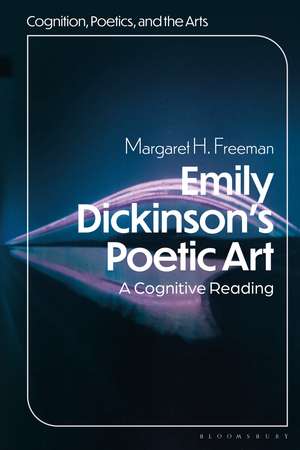Emily Dickinson's Poetic Art: A Cognitive Reading: Cognition, Poetics, and the Arts
Autor Professor Margaret H. Freeman Professor or Dr. Alexander Bergs, Professor Peter Schnecken Limba Engleză Paperback – 31 mai 2023
| Toate formatele și edițiile | Preț | Express |
|---|---|---|
| Paperback (1) | 166.99 lei 3-5 săpt. | +43.47 lei 5-11 zile |
| Bloomsbury Publishing – 31 mai 2023 | 166.99 lei 3-5 săpt. | +43.47 lei 5-11 zile |
| Hardback (1) | 539.73 lei 6-8 săpt. | +49.81 lei 5-11 zile |
| Bloomsbury Publishing – 31 mai 2023 | 539.73 lei 6-8 săpt. | +49.81 lei 5-11 zile |
Preț: 166.99 lei
Preț vechi: 193.12 lei
-14% Nou
Puncte Express: 250
Preț estimativ în valută:
31.95€ • 33.45$ • 26.60£
31.95€ • 33.45$ • 26.60£
Carte disponibilă
Livrare economică 10-24 martie
Livrare express 22-28 februarie pentru 53.46 lei
Preluare comenzi: 021 569.72.76
Specificații
ISBN-13: 9781501398186
ISBN-10: 1501398180
Pagini: 256
Dimensiuni: 152 x 229 x 21 mm
Greutate: 0.4 kg
Editura: Bloomsbury Publishing
Colecția Bloomsbury Academic
Seria Cognition, Poetics, and the Arts
Locul publicării:New York, United States
ISBN-10: 1501398180
Pagini: 256
Dimensiuni: 152 x 229 x 21 mm
Greutate: 0.4 kg
Editura: Bloomsbury Publishing
Colecția Bloomsbury Academic
Seria Cognition, Poetics, and the Arts
Locul publicării:New York, United States
Caracteristici
Allows readers to distinguish between different approaches to literary criticism and interpretation, especially the distinction between readings that capture a poet's motivations and style and readings that do not account for this
Notă biografică
Margaret H. Freeman is Co-Director of the Myrifield Institute for Cognition and the Arts, MA, USA. Professor Freeman's past publications include The Poem as Icon: A Study in Aesthetic Cognition (2020).
Cuprins
PrefaceAcknowledgments1. Demure as Dynamite: Dickinson and Cognition2. Everything Counts: Reading the Manuscripts3. The Manuscript Markings4. Measuring Time in Meter and Rhythm5. Affective Prosody6. The Life of Words7. Bringing a Poem to Life8. Intimate Discourse9. Grounded-Self Spaces10. The Presence of Self11. The Way We Map12. Intentional Mapping13. Conceiving a Universe14. A Transformative Poetics15. Dickinsonian CognitionAppendixReferencesIndex of First LinesSubject Index
Recenzii
Freeman's book is not just an engagingly learned re-introduction to Emily Dickinson but a provocation to consider how contemporary scholarship on embodied cognition may serve as a means of building a more complete understanding of Dickinson's poetic art.
Drawing on the insights of cognitive science, Margaret Freeman demonstrates that understanding a poem, even before any attempt at interpretation, is to cognitively experience it, allowing it to reveal itself by what it is saying and doing. Her subtle and meticulous analyses illustrate how those "animate organisms" work, and they are thus true eye-openers as well as an enormous gain for all lovers of Dickinson's poems, academics and general readers alike.
Margaret Freeman's new book challenges our preconceptions not only about Emily Dickinson but also about the rapidly growing field of cognitive literary studies. She works scrupulously with all levels of Dickinson's poems, descrying impalpable nuances of poetic language while never losing sight of the final analysis and sense of indefinable but alluring artistic work. Freeman's book applies cognitive science findings and heuristics to literary studies and proffers a holistic view of the ways we read a poem, accompanied by step-by-step comments and striking readings.
Drawing on the insights of cognitive science, Margaret Freeman demonstrates that understanding a poem, even before any attempt at interpretation, is to cognitively experience it, allowing it to reveal itself by what it is saying and doing. Her subtle and meticulous analyses illustrate how those "animate organisms" work, and they are thus true eye-openers as well as an enormous gain for all lovers of Dickinson's poems, academics and general readers alike.
Margaret Freeman's new book challenges our preconceptions not only about Emily Dickinson but also about the rapidly growing field of cognitive literary studies. She works scrupulously with all levels of Dickinson's poems, descrying impalpable nuances of poetic language while never losing sight of the final analysis and sense of indefinable but alluring artistic work. Freeman's book applies cognitive science findings and heuristics to literary studies and proffers a holistic view of the ways we read a poem, accompanied by step-by-step comments and striking readings.


